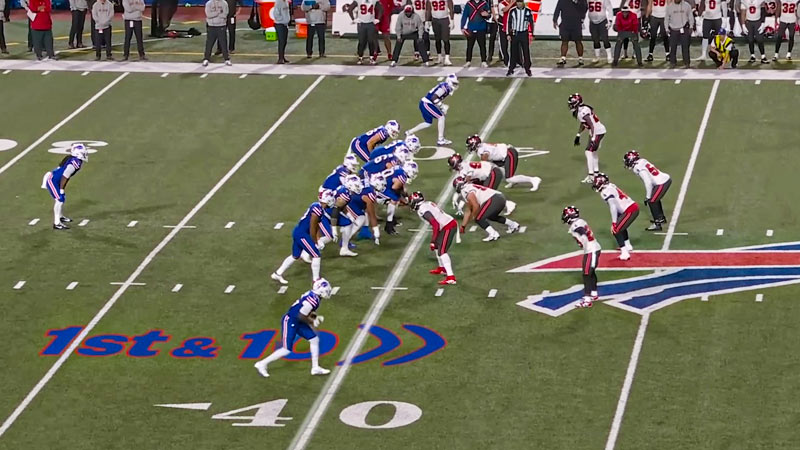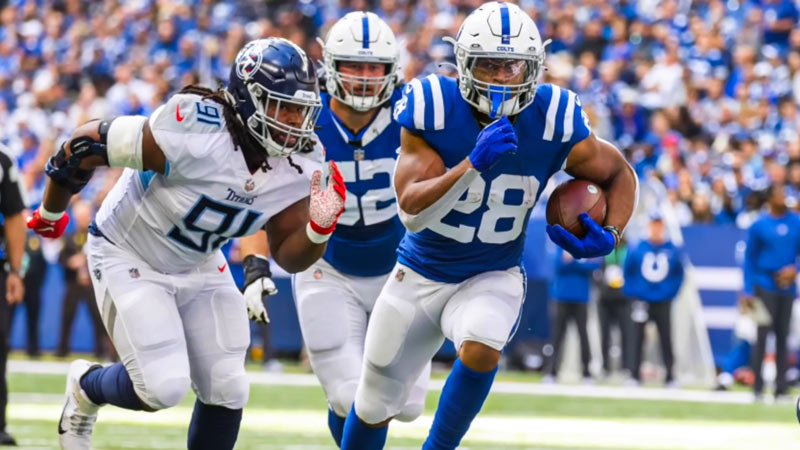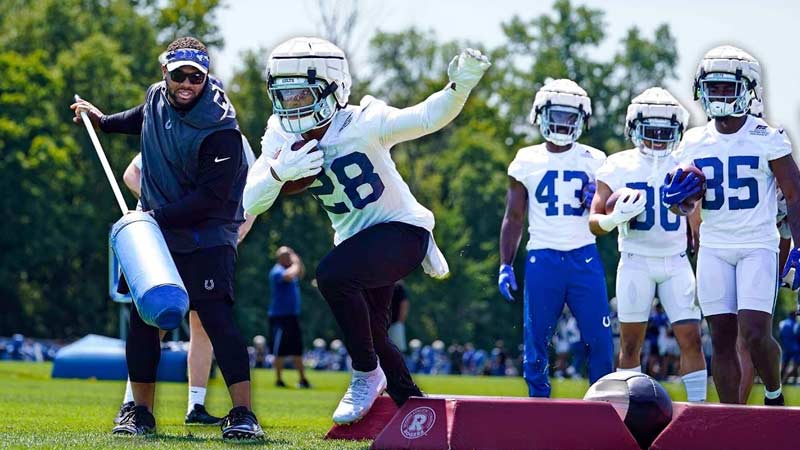The world of football is a dynamic chessboard where strategic plays can make all the difference between victory and defeat.
One critical aspect of this strategic dance is the football playbook, a comprehensive guide that serves as the blueprint for a team’s success.
Whether you’re a seasoned player or a rookie trying to earn your spot on the squad, mastering the playbook is paramount. In this blog post, we’ll delve into effective techniques to help you memorize football plays like a pro.
From understanding the fundamental concepts to creating visual aids, we’ll explore the strategies that will take your playbook retention to the next level.
With these tips and practices, you’ll not only improve your on-field performance but also gain a deeper appreciation for the intricate game of football.
How to Memorize a Football Playbook?
For so many reasons you must learn how to memorize football plays. Memorizing a football playbook can be a challenging but essential task for players. Here’s a concise guide:
- Understand the Concepts: Start by comprehending the basic offensive and defensive concepts. Understand the terminology and the role of each player on the field.
- Break it Down: Divide the playbook into manageable sections, such as formations, runs, passes, and defensive sets. Focus on one section at a time.
- Visual Aids: Use visual aids like diagrams and videos to help you visualize plays. Many players find it easier to remember when they can see it in action.
- Repetition: Practice is key. Repetition helps reinforce memory. Walk through the plays repeatedly on the field to build muscle memory.
- Teach Someone Else: Teaching a teammate can reinforce your own understanding. It forces you to articulate what you’ve learned.
- Mnemonic Devices: Create acronyms or memorable phrases to help remember play names or assignments.
- Study Daily: Set aside time every day to review the playbook. Consistent study is more effective than cramming.
- Stay Organized: Keep your playbook well-organized and take notes if needed.
- Mental Visualization: Before sleep, visualize executing plays successfully. This can improve recall.
- Seek Feedback: Get feedback from coaches to ensure you’re understanding and executing plays correctly.
Remember, mastering a playbook takes time and dedication. Be patient and persistent in your efforts.
Break the Playbook Down for Memorizing Fast

To quickly memorize a football playbook, follow these steps for efficient learning:
Start with the Basics
Begin by learning the fundamental formations and plays. Focus on the core concepts that your team uses most frequently.
Position-Specific Knowledge
Concentrate on understanding the responsibilities and roles of your specific position first. This simplifies the playbook into manageable portions.
Simplify Terminology
Break down complex terminology and jargon into simpler terms. Create your own mental cues or abbreviations to remember play names and assignments.
Group Plays by Type
Categorize plays by type, such as runs, passes, and defensive strategies. This will help you recognize patterns and similarities among plays.
Visual Aids and Flashcards
Create flashcards or visual aids for each play, with diagrams and descriptions. Use color coding to associate plays with specific scenarios. Work with a teammate to walk through plays, teaching each other. Teaching can enhance your own understanding.
Progressive Learning
Start with a few plays and gradually add more as you become comfortable. This prevents overwhelming yourself with the entire playbook at once.
Dedicate time each day to review the plays you’ve learned. Consistency is essential for memory retention. Seek clarification and feedback from coaches to ensure you’re interpreting plays correctly.
Also, you should apply what you’ve learned on the field during team practices. Muscle memory enhances your ability to recall plays quickly.
Breaking down the playbook into manageable components, simplifying terminology, and employing visual aids are effective strategies for faster memorization.
Visual Aids That Help to Remember Football Playbook

Visual aids can significantly assist in memorizing a football playbook. Here are six elaborative points on how to use visual aids effectively:
Play Diagrams
Create detailed diagrams for each play. Use lines, arrows, and shapes to represent player movements, positions, and routes. Incorporate different colors for offense and defense.
Visualizing the play’s structure helps players understand their roles better.
Film Study
Incorporate game film or practice footage into your visual aids. Use software to mark up the video with annotations and highlights, making it easier to analyze plays.
Pausing and rewinding specific moments can reinforce the memory of in-game situations.
Position-Specific Guides
Design visual aids tailored to each player’s position. For instance, quarterbacks can use diagrams highlighting their reads, progressions, and potential throw options, while linemen may focus on blocking assignments.
Interactive Apps
Utilize digital tools and apps specifically designed for sports playbooks. These apps often allow you to create and manipulate 3D play diagrams, providing a dynamic visual experience for understanding plays.
Flashcards
Create flashcards with play names, diagrams, and brief descriptions on one side and the key responsibilities on the other. This aids in quick recall of plays and player assignments.
Whiteboards and Chalkboards
Use physical boards to draw out plays during meetings or on the sideline.
Coaches can use these to visually explain plays and make real-time adjustments. Players can also practice drawing plays from memory on these boards to reinforce their understanding.
Visual aids not only simplify complex plays but also cater to different learning styles, making the playbook more accessible to players.
They can be particularly helpful in reinforcing concepts and ensuring everyone on the team is on the same page.
Repetition and Practice for Memorizing Football Playbook

Repetition and practice are key elements in memorizing a football playbook effectively. Here’s how to leverage these strategies for playbook retention:
Regular Repetition
Continuously review the playbook to reinforce your memory. Dedicate time daily to revisit plays, formations, and assignments. Repetition helps engrain the information in your mind.
Walkthroughs and Drills
On the field, conduct walkthroughs and drills based on the playbook. Physically going through the motions enhances muscle memory and ensures that you understand your role in each play.
Team Practice
Engage in team practices and scrimmages to apply what you’ve learned. Live situations help you adapt and react to dynamic game scenarios, reinforcing your knowledge of plays.
Mental Reps
When you can’t be on the field, engage in mental repetitions. Visualize yourself executing plays correctly, step by step. This mental rehearsal helps improve recall during actual games.
Peer and Coach Feedback
Seek feedback from teammates and coaches during practice. Correcting mistakes and receiving guidance ensures you’re not only memorizing but also understanding and executing plays correctly.
Variation and Adaptation
Introduce variations or challenges during practice to keep the learning process dynamic. This forces you to think on your feet, helping solidify your understanding of the playbook.
Remember that effective playbook memorization is not just about rote learning but understanding the concepts and applying them during practice.
Through consistent repetition and practical application, you’ll be better prepared to execute plays with confidence during real games.
Tips on How to Remember Football Plays

Remembering football plays is crucial for every player. Here are seven detailed tips to help you master them effectively:
Understand the Conceptual Framework
Begin by grasping the overarching offensive and defensive strategies your team employs. Understanding the fundamental concepts behind your plays will make them easier to remember.
For example, recognize whether your team is a run-heavy or pass-heavy offense, and what the defensive focus is (e.g., stopping the run or pass rush).
Chunk Information
Instead of trying to memorize the entire playbook at once, break it down into smaller, manageable chunks.
Start with a specific formation or a set of plays, and master those before moving on to the next segment. This approach prevents overwhelming yourself.
Create Visual Associations
Visual aids can be highly effective. Create diagrams, drawings, or flashcards for each play. Use different colors or symbols to represent positions, routes, and movements.
Associating the visual representation with the play’s name and purpose can enhance memory.
Use Mnemonics and Acronyms
Create acronyms or memorable phrases for play names and key responsibilities. For instance, for a pass play called “Double Post,” you might use the acronym “DP” and associate it with “Deep Pass.”
This simplifies complex play names and assignments.
Practice with Repetition
Practice is essential. Repetition helps reinforce memory. Walk through plays on the field, repeatedly visualizing your role and responsibilities. The more you practice, the more automatic your reactions become during games.
Teach Others
Teaching a teammate or a friend is an effective way to remember plays. Explaining the plays to someone else requires you to articulate your understanding, which strengthens your own memory.
Consistent Daily Review
Set aside dedicated time daily for playbook review. Consistency is more effective than cramming. Even if you’ve already memorized plays, regular review helps maintain and reinforce your knowledge.
Practice in Game-Like Scenarios
During practice, simulate real game scenarios. This includes situational drills and competitive situations. Applying plays in game-like conditions enhances your ability to recall them when it matters most.
Get Feedback from Coaches
Seek feedback and clarification from your coaches regularly. They can provide insights into the finer details of plays and ensure you’re interpreting them correctly.
Study Opponents
Understanding your opponents’ defensive and offensive strategies can help you anticipate plays. This awareness can make it easier to remember your assignments and responsibilities.
Mastering a football playbook takes time and effort. These detailed tips can help you enhance your memory and understanding of plays, ultimately contributing to your success on the field.
FAQs
How to study football plays?
To study football plays, watch game footage, read playbooks, and analyze strategies. Break down plays step by step to understand player roles, formations, and tactics.
What is the best way to learn football plays?
The best way to learn football plays is through practice, repetition, and understanding the playbook. Attend team meetings, run drills, and ask questions to clarify any doubts.
How to remember football plays easily?
Remember football plays easily by visualizing them, creating mental cues for each play, and practicing regularly. Associating plays with specific scenarios can enhance recall.
How to memorize a playbook with easy codes?
Memorize a playbook with easy codes by using mnemonic devices, color-coding, or creating simplified diagrams. Develop a system that works for you and reinforces play recognition.
How to learn football plays efficiently?
Learn football plays efficiently by seeking guidance from coaches and experienced players. Focus on understanding the concepts behind plays, practice regularly, and stay mentally engaged during training sessions.
Wrapping Up
In the complex world of football, where plays unfold in the blink of an eye, a well-memorized playbook can be your guiding light.
As we conclude our journey through the art of playbook memorization, remember that it’s not just about rote learning; it’s about understanding the game’s essence.
Visual aids, mental rehearsals, and dedicated practice can turn complex plays into second nature. So, whether you’re a quarterback, a lineman, or any other position on the field, mastering the playbook is a constant process.
By consistently applying the strategies we’ve explored, you’ll not only cement plays in your memory but also elevate your game, making you an invaluable asset to your team.
Football isn’t just a sport; it’s a captivating strategy game where your ability to recall plays can be the key to your team’s triumph.







